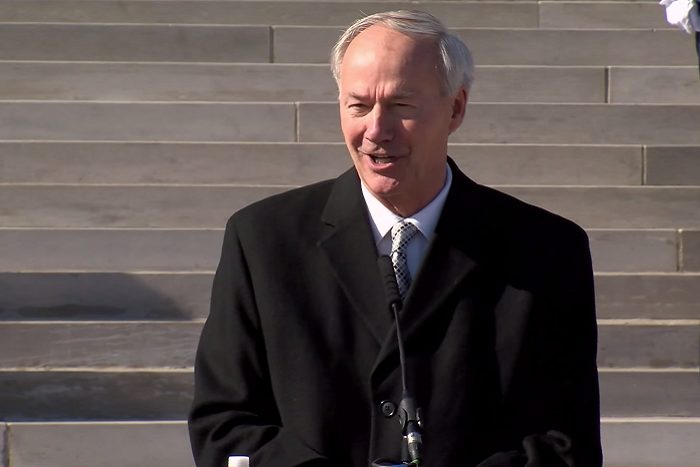Arkansas Governor Signs Telemedicine Abortion Ban
Telemedicine abortion care isn't available in Arkansas, but a state representative told local media the law would "stop it before it starts."

Arkansas Gov. Asa Hutchinson (R) signed a bill into law Wednesday that bans the use of telemedicine for medication abortions in the state.
Telemedicine abortion care isn’t available in Arkansas, but a state representative told local media the law would “stop it before it starts.”
SB 53, filed by state Sen. Missy Irvin (R-Mountain View), was approved by the state house a week after being passed by the senate. Both chambers passed the bill by wide margins.
The bill is the first anti-choice restriction to become law this year of the dozens of bills introduced in state legislatures.
The new law will require that a pregnant person who is seeking a medication abortion be physically in a room with a physician when the medication is administered.
“It’s crystal clear that these laws are motivated by a desire to keep a woman who has decided to have an abortion from getting one,” Jennifer Dalven, director of the ACLU’s Reproductive Freedom Project, said in statement after Hutchinson signed the bill.
“We all want women to be safe, but these laws aren’t about improving care for women,” Dalven said. “They’re designed by politicians, not doctors, to cut off access to safe, legal abortion by any means necessary.”
During the January 18 March for Life rally in Little Rock, Hutchinson signaled his support for the legislation. “As governor, I support telemedicine, but this is not the right application. It should be prohibited,” he said during the rally.
The governor’s office did not release a statement or announce the signing of the bill on social media.
Arkansas is the 17th state to ban telemedicine abortion care. It has been banned now across the South, including in Missouri, Louisiana, Mississippi, and Alabama.
Abortion providers use telemedicine to offer women who do not live near a reproductive health provider, many of them in rural areas, with access to abortion care. At a local health clinic, where the medication is dispensed, a patient will sit with a nurse while communicating with her doctor via video conferencing tools.
Access to abortion care is highly restricted in Arkansas, and women seeking to terminate a pregnancy must comply with a mandatory waiting period and forced counseling. There are only three clinics that provide abortion care in the state: one in Fayetteville and two in Little Rock.
The population of the state is dispersed among many small towns and rural areas. Little Rock and Fayetteville, the first and third most populous cities, respectively, are home to just 276,000 of the state’s nearly three million residents, according to U.S. Census figures.
With the three clinics that provide abortion care located in just two of the state’s 75 counties, that leaves 97 percent of Arkansas counties without an abortion clinic. Seventy-eight percent of Arkansas women lived in these counties, according to the Guttmacher Institute.
Telemedicine abortion care is not available in the state, but state Rep. Julie Mayberry (R-East End) said that she wanted to prevent the service from ever being an option. “We want to make sure that we stop it before it starts. It’s so much easier to prevent bad medicine than it is to stop it after it’s started,” Mayberry said, as reported by Arkansas Public Radio.
Research has shown that telemedicine abortion is safe and effective. Ibis Reproductive Health has concluded that “restricting telemedicine for medication abortion is not evidence based, and limits women’s access to high-quality abortion care, particularly in rural areas.”
During the senate floor debate, Mayberry said medication abortions can have side effects, including bleeding and more serious problems. Mayberry claims that while researching the bill, she found statistics that said 5 percent of women who have medication abortions need to have surgical abortions later because the medication was ineffective, according to reporting by the Arkansas Democrat-Gazette.
Between 0.5 percent and 2 percent will require suction aspiration because of heavy or prolonged bleeding, according to the National Abortion Federation. Medication abortion is “safe, as severe complications are extremely rare,” the Guttmacher Institute has found. The use of medication to terminate a pregnancy has a 92 to 95 percent success rate, which is comparable to surgical abortion.
The new law, officially titled Act 139, will become effective 90 days after the state legislature adjourns.

